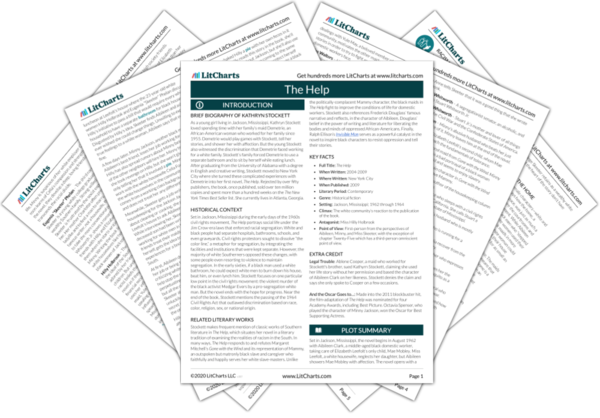“Help” normally signifies the giving of free services or resources to those in need, but the novel’s title refers directly to the underpaid black domestic workers who, paradoxically, are the ones “helping” their wealthier and more powerful employers, people who have no real need of help. By referring to these women as “the help,” the white housewives uphold the illusion that the maids are like volunteers who want—or should be grateful for the opportunity—to work for less than minimum wage, and for families that treat them as subhuman. The white women refuse to even consider that they could be the ones “helping” the maids by promoting civil rights in white communities.
This irrational and absurd system in which poor black people “help” the rich whites gives way to widespread hypocrisy in white society. Miss Hilly believes that her bathroom bill and Jim Crow segregation laws actually “help” black people. She even takes the moral high ground by raising funds to “help” needy children in Africa, but this is actually a false generosity meant to raise her class status as a charitable woman. Hilly is not capable of understanding that this desire is rooted in a racist paternalism that infantilizes black people as completely helpless, adding further irony to the fact that the black domestic workers are actually the ones “helping” their white employers. If Hilly truly cared about generosity and not merely the appearance of generosity, she would provide fair wages to the woman working in very own her kitchen – not as an act of charity but as a way of amending a social injustice.
The question of help becomes most complicated with regards to the relationship between the maids and the white children they raise. Stockett depicts this relationship as if the maids were as close with the children as a mother would be, despite the fact the maids are being paid to raise and be kind to the children. Unlike real mothers, they aren’t allowed to snap or yell at the children, so it is no wonder the children love them more than their actual mothers. But Aibileen seems to genuinely care for Mae Mobley, wanting to give her the self-confidence she’ll need to deal with her verbally abusive mother when she’s older. While Aibileen’s emotions may be genuine, the economic relationship between maid and employer – which makes the bond between maid and child possible – ensures that Mae Mobley will never be able to love Aibileen for who Aibileen really is. Instead, Mae Mobley’s image of Aibileen will always be corrupted the fact that she was, on one level, just a kind maid who was paid to “mother” her.
Skeeter models a truer form of “help,” however, by risking her own life and reputation to give the maids a platform to tell their stories. The maids have never received help from a white person before, so at first they are suspicious that Skeeter would risk “helping the help.” As the maids come to see her desire to help as a form of genuine concern for the plight of the African-American community, they agree to tell their stories. By the novel’s conclusion, the maids realize that Skeeter’s help consists not of monetary charity but a dogged attempt to learn about their lives in an effort to transcend racial divides and cultivate a mutual and genuine understanding based on human compassion.
Help vs. Hypocrisy ThemeTracker

Help vs. Hypocrisy Quotes in The Help
Aibileen just stood there and I wished I wasn’t in the room. Please, I thought, please don’t say thank you.
“Yes ma’am.” Aibileen opened a drawer and reached inside, but Hilly kept looking at her. It was so obvious what she wanted.
Another second passed with no one moving. Hilly cleared her throat and finally Aibileen lowered her head. “Thank you, ma’am,” she whispered. She walked back into the kitchen. It’s no wonder she doesn’t want to talk to me.

Unlock explanations and citation info for this and every other The Help quote.
Plus so much more...
Get LitCharts A+I realize, like a shell cracking open in my head, there’s no difference between these government laws and Hilly building Aibileen a bathroom in the garage, except ten minutes’ worth of signatures in the state capital.
“It is my job, Skeeter! You know well as I do, people won’t buy so much as a slice of pound cake from an organization that harbors racial integrationists!”
“Hilly.” I just need to hear her say it. “Just who is all that pound cake money being raised for, anyway?”
She rolls her eyes. “The Poor Starving Children of Africa?”
I wait for her to catch the irony of this, that she’ll send money to colored people overseas, but not across town.
“She needs to learn that she can’t carry on this way. I mean, around us it’s one thing, but around some other people, she’s going to get in big trouble.”
“It’s true. There are some racists in this town,” Miss Leefolt say. Miss Hilly nod her head, “Oh, they’re out there.”
I walk out the back door, to the terrible sound a Mae Mobley crying again. I start down the driveway, crying too, knowing how much I’m on miss Mae Mobley, praying her mama can show her more love. But at the same time feeling, in a way, that I’m free…Freer than Miss Leefolt, who so locked up in her own head she don’t even recognize herself when she read it. And freer than Miss Hilly. That woman gone spend the rest a her life trying to convince people she didn’t eat that pie. I think about Yule May setting in jail. Cause Miss Hilly, she in her own jail, but with a lifelong term.











